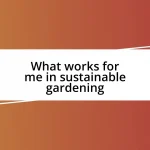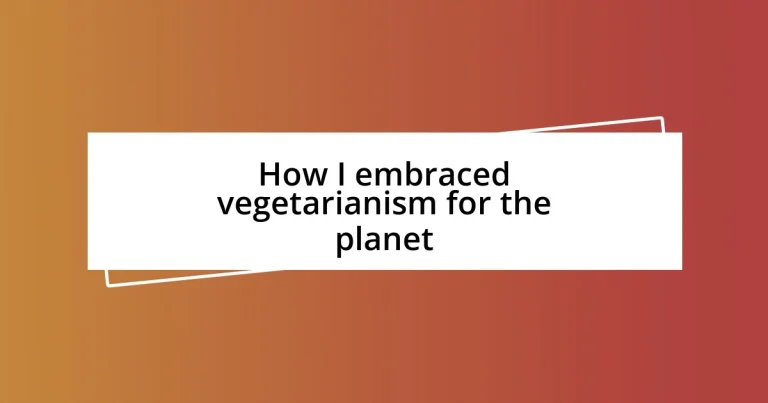Key takeaways:
- Transitioning to vegetarianism significantly reduces greenhouse gas emissions and conserves resources, positively impacting the environment.
- Personal motivations for going vegetarian include ethical concerns regarding animal welfare and the health benefits of a plant-based diet.
- Maintaining a balanced vegetarian lifestyle involves meal planning, exploring new ingredients, and finding joy in sharing plant-based meals with others.
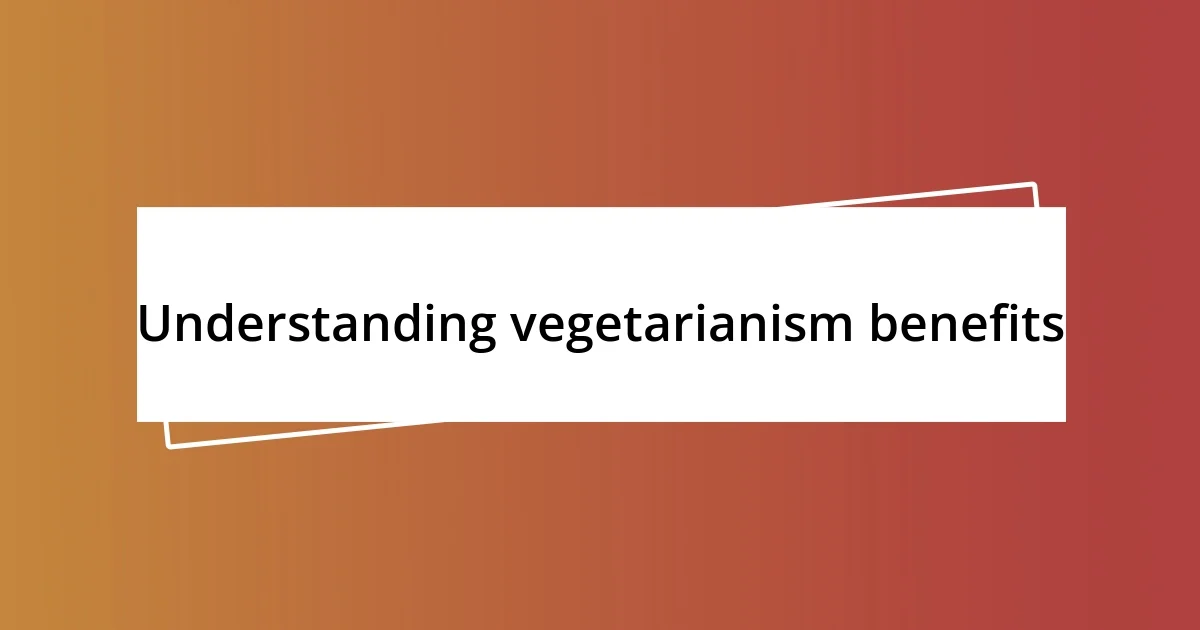
Understanding vegetarianism benefits
One of the most eye-opening benefits of vegetarianism for me has been the profound positive impact on the environment. When I made the switch, I discovered that plant-based diets can significantly reduce greenhouse gas emissions. Isn’t it fascinating to think about how the food choices we make at every meal contribute to the health of our planet?
I remember the first time I really looked into the land and water usage involved in meat production. It struck me: it takes a staggering amount of resources to raise livestock. By choosing to eat vegetables, grains, and legumes, I felt empowered to decrease my ecological footprint. Can you imagine the cumulative effect if more people embraced this shift? Each meatless meal symbolizes a step toward a more sustainable future.
Furthermore, I experienced a new sense of connection with the food I consumed. Eating vegetarian pushed me to explore a variety of fruits and vegetables, leading to a greater appreciation for seasonal and locally sourced produce. This shift opened my eyes to the richness of nature and interconnectedness of our food systems. Isn’t it rewarding to feel that what’s on your plate can affect not just our bodies but the world around us?
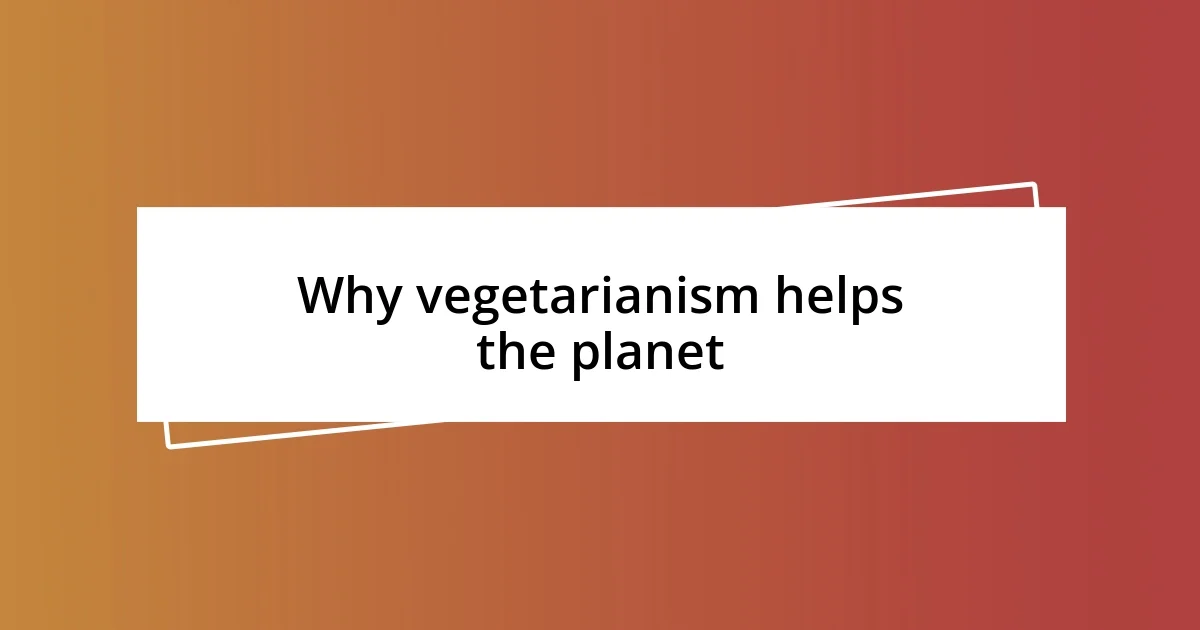
Why vegetarianism helps the planet
Adopting a vegetarian lifestyle has shown me just how significant our dietary choices are in combating climate change. I was shocked to learn that livestock farming produces more greenhouse gases than all the world’s cars, planes, and trains combined. When I made the switch, I felt a sense of responsibility wash over me, knowing that every meal I enjoyed was contributing to a healthier planet.
Here are some key reasons why vegetarianism is beneficial for the Earth:
- Lower Carbon Footprint: Plant-based diets result in a reduction of carbon dioxide emissions, as they generally require less energy and fewer resources.
- Resource Conservation: It takes approximately 1,800 gallons of water to produce just one pound of beef, compared to a fraction of that for vegetables, grains, and legumes.
- Land Usage: Raising livestock requires vast amounts of land, leading to deforestation and habitat loss. Shifting to vegetarianism can help preserve ecosystems.
- Biodiversity: Reduced meat production can lead to flourishing ecosystems, where varied plant and animal life can thrive unimpeded by industrial farming practices.
- Waste Reduction: Animal farming produces significant waste that can contaminate water supplies. By choosing plants, we can lessen that burden on our environment.
Transforming my diet not only felt impactful but also invigorated my connection to nature. The thought that my meal choices could be a direct uplift for the planet became a motivating force. I started seeking out local farmers’ markets and experiencing the joy of fresh, in-season produce. It made me realize that every plate can be a powerful statement in protecting our environment.
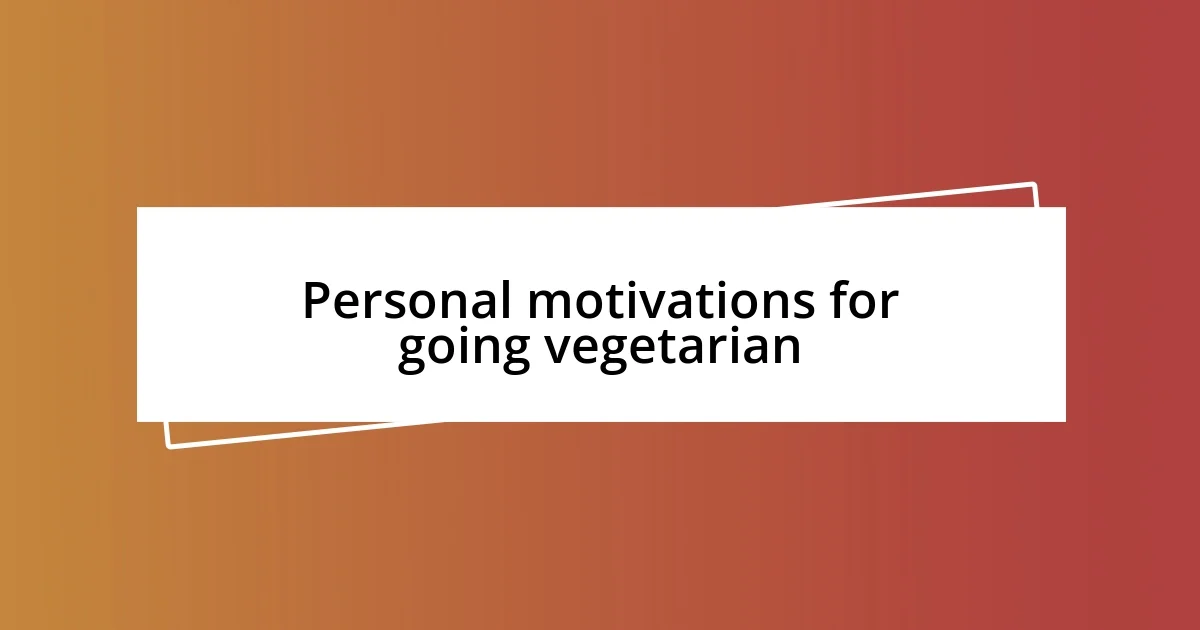
Personal motivations for going vegetarian
One of my deepest personal motivations for transitioning to vegetarianism was realizing the ethical implications of my food choices. I remember a moment of genuine discomfort when I stumbled upon footage of factory farming. The images haunted me, making it impossible to enjoy a meal without considering the suffering behind my food. It was at that point I decided to align my diet with my values, prioritizing compassion over convenience.
Another key motivator was the health benefits I discovered along the way. I never expected to feel so energized! Shifting to a plant-based diet not only made me more mindful about what I was eating but also allowed me to explore new recipes bursting with colors and flavors. My initial hesitation was replaced by excitement as I dived into crafting veggie-packed meals, noticing how vibrant foods can brighten both my plate and my mood.
Ultimately, my choice to embrace vegetarianism transcended personal health; it became a holistic journey towards better living. I found joy in sharing this experience with others, whether through cooking classes or simply inviting friends over for a plant-based dinner. Each conversation sparked new insights, and my connections deepened as we explored this shared commitment to sustainability. It’s amazing how personal choices can ripple outward, fostering community and shared values.
| Motivation | Impact |
|---|---|
| Ethical Concerns | Alignment of diet with personal values and compassion |
| Health Benefits | Increased energy levels and culinary creativity |
| Community Engagement | Connection with others through shared plant-based meals |
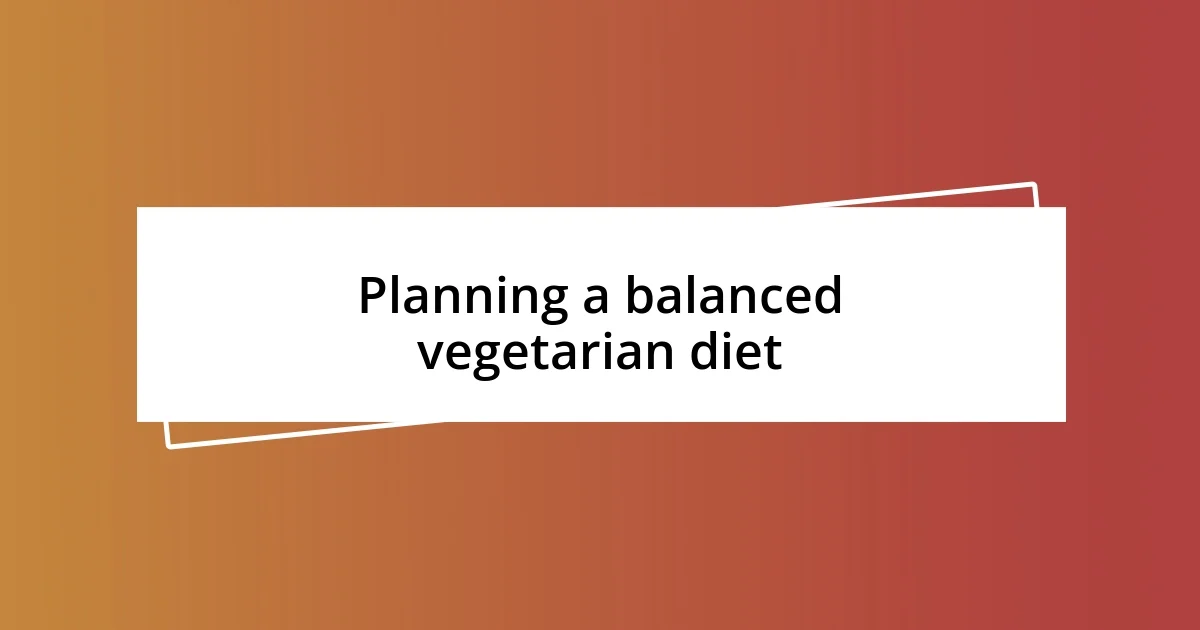
Planning a balanced vegetarian diet
Planning a balanced vegetarian diet can seem daunting at first, but I found it to be an enriching experience. Early on, I remember feeling overwhelmed by the variety of vegetables, grains, and legumes available. I asked myself, “How do I ensure I’m getting all the nutrients my body needs?” Through research and some trial and error, I learned that focusing on a colorful plate not only made my meals visually appealing but also ensured I was consuming a wide range of vitamins and minerals.
Incorporating a variety of protein sources became a game changer for me. Initially, I thought of protein as something that could only come from meat. However, I soon discovered that beans, lentils, quinoa, and even nuts are fantastic alternatives packed with protein. I vividly recall my first successful lentil curry—rich, hearty, and packed with flavor! Can you imagine transforming simple pantry staples into something so satisfying? It was moments like these that made me appreciate the abundance of options available in vegetarian cooking.
I also realized the importance of meal planning in maintaining a balanced diet. Setting aside a few hours each week to prepare meals not only saved me time but allowed me to experiment with new recipes and ingredients. I found joy in creating dishes that were not only delicious but also contributed to my family’s health. Wouldn’t it be nice to feel good about your meals and their impact on the planet simultaneously? Each meal became an opportunity for creativity, and I loved knowing I was making conscientious choices for both myself and the environment.
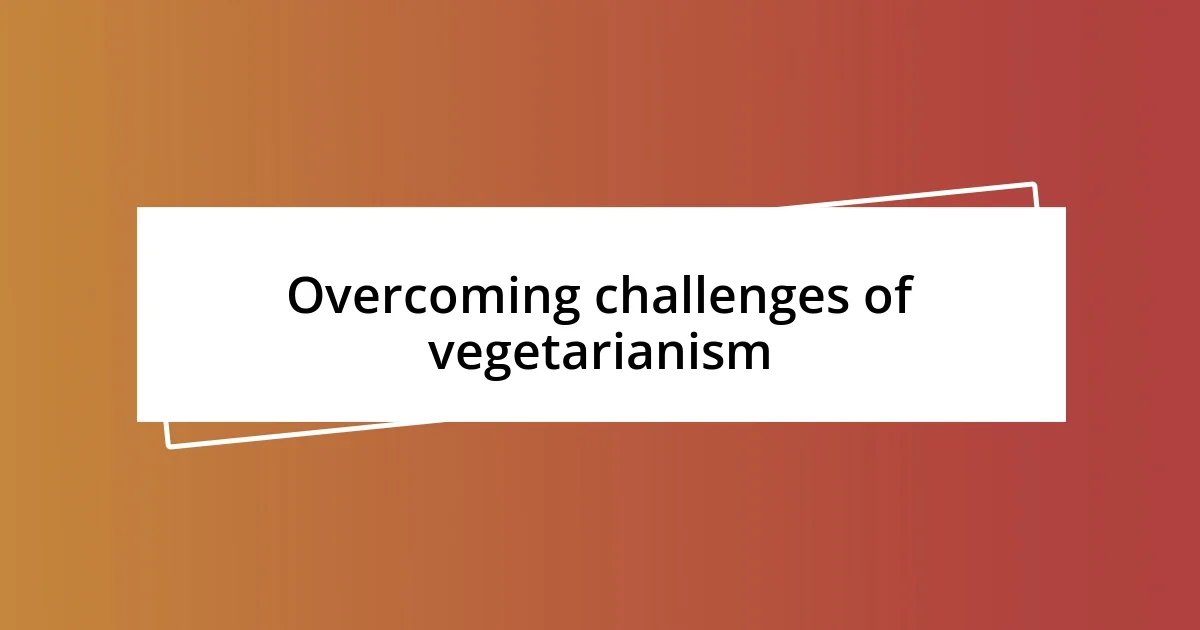
Overcoming challenges of vegetarianism
Sometimes, the biggest hurdle I faced in my vegetarian journey was the social aspect. Dining out with friends or attending family gatherings often posed challenges, as not everyone understood or embraced my new lifestyle. I remember one particular dinner party where I felt like a fish out of water, awkwardly navigating a menu filled with meat options. But I learned to communicate my needs confidently, even suggesting fun plant-based dishes that surprised everyone. Isn’t it liberating to see how openness can lead to not only acceptance, but also inspiration among friends and family?
Another significant challenge was dealing with cravings for comfort foods. There were nights when I craved a cheesy pizza or a hearty burger, and I felt a tinge of frustration. However, I turned this challenge into an opportunity for creativity. I experimented with various recipes, revamping classic indulgences into vegetarian delights. I still remember my first cauliflower pizza crust experiment—it was a revelation! By focusing on the flavors I loved, I discovered that comfort food could be transformed while still aligning with my values. Hasn’t culinary experimentation opened new horizons for many of us?
Adapting to a vegetarian lifestyle also meant addressing misconceptions and myths. I encountered numerous questions, often tinged with skepticism: “Where do you get your protein?” or “Aren’t you missing out?” Initially, these conversations felt daunting, but over time, I realized they presented a chance to share my experience and educate others. I sought out informative resources and embraced conversations with curiosity rather than defensiveness. By doing so, I not only reinforced my own choices but also inspired others to consider the environmental impacts of their diets. Isn’t it interesting how a simple meal choice can spark meaningful discussions?
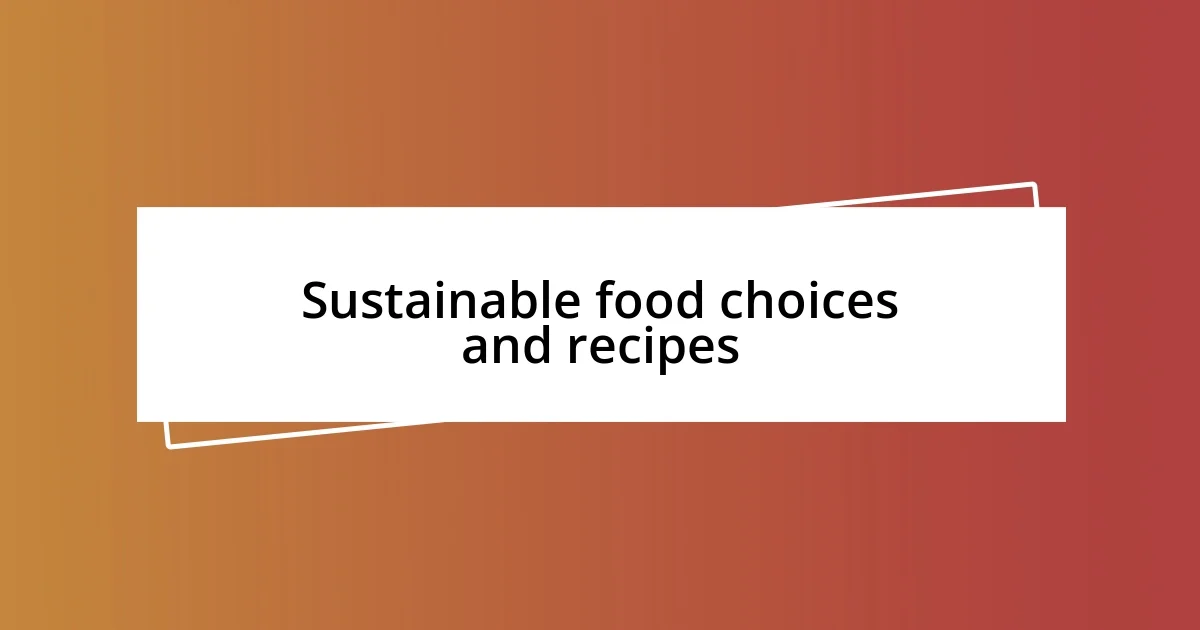
Sustainable food choices and recipes
Sustainable food choices revolve around selecting ingredients that are not only good for our health but also for the planet. I remember my first experience at a local farmers’ market; the energy was contagious. It was eye-opening to see the fresh, seasonal produce, and I found myself picking out vibrant vegetables I had never tried before. The question arose, “How can I incorporate these local delights into my meals?” It led to some delightful experimentation in my kitchen, like a roasted beet salad that became a weekly staple.
When it comes to sustainable recipes, simplicity often reigns supreme. I discovered that creating dishes with minimal ingredients not only highlights the natural flavors but also reduces waste. For instance, a one-pot vegetable stir-fry became my go-to for busy nights, combining whatever was left in my fridge with a splash of soy sauce and a handful of rice. I didn’t just enjoy the ease of cooking; I felt a sense of pride knowing I was minimizing my environmental footprint. Have you ever noticed how sometimes the simplest meals bring the greatest satisfaction?
Lastly, I found joy in sharing plant-based meals with loved ones. One dinner with friends, I whipped up a creamy avocado pasta dish, which was a hit! Watching their surprise as they realized it was entirely plant-based made my heart swell. It’s these moments that make embracing vegetarianism feel rewarding. Doesn’t it feel great when our choices not only nourish us but also inspire others to see food in a new light?
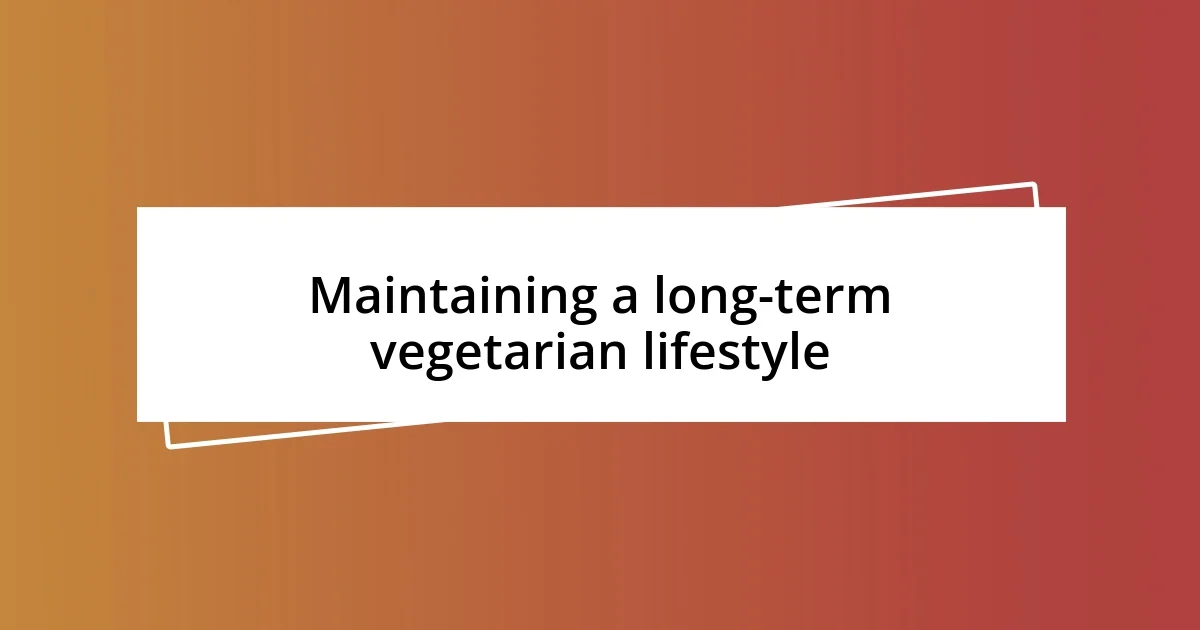
Maintaining a long-term vegetarian lifestyle
Maintaining a long-term vegetarian lifestyle has been a journey of continuous adaptation. I vividly remember the first time I found myself standing in the spice aisle, feeling overwhelmed yet excited about the possibilities. I made a conscious decision to stock my pantry with a diverse array of spices and legumes. This little change not only enhanced my meals but also made cooking feel more adventurous. Have you had that experience where just a few ingredients spark your creativity in the kitchen?
Staying inspired is equally important. I often explore vegetarian blogs and cookbooks, seeking fresh ideas that ignite my culinary passion. One afternoon, while scrolling through a blog, I stumbled upon a recipe for jackfruit tacos. I was initially skeptical, but after one scrumptious bite, I was hooked. That sort of thing—discovering a new favorite dish—helps me stay committed. Isn’t it fascinating how food can become a driving force in our lifestyle choices?
On a practical level, meal planning has become my best friend. By taking a couple of hours each week to plan my meals, I save myself from the dreaded “What should I eat?” dilemma when hunger strikes. I’ve learned to prepare large batches of soups or veggie stews that I can freeze for busy days. There’s a sense of security and accomplishment that comes with knowing I have nourishing options ready at my fingertips. Isn’t that a comforting thought—knowing you’re prepared to fuel your body and the planet?
